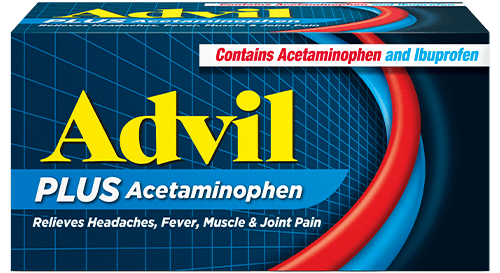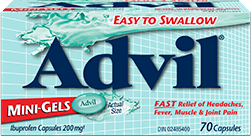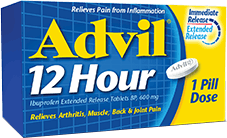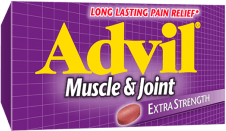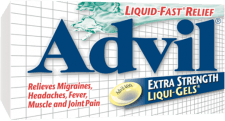Muscle Aches & Pains
Learn more on treating strains, sprains and muscle cramps.
Almost everyone will experience a sore muscle at some point – in fact, general muscle aches and pains can be considered normal when you start a new activity or increase the intensity or duration of exercise. Some common causes of muscle pain may include tension, stress, overuse, and minor injuries.
What are some common types of Muscle Aches?
- Strains: a stretching or tearing of a tendon (the cord of tissue that connects muscles to bone) or to the muscle itself. There are two kinds of strains, acute and chronic. An acute strain results from pulling a muscle too far or too rapidly. A chronic strain occurs when a muscle is subjected to prolonged, repetitive movements.
- Sprains: a stretching or tearing of a ligament (the band of tissue that connects two bones at a joint).
- Muscle cramps: a sudden, painful, involuntary contraction of a muscle. Over 90% of muscle cramps occur in the hamstrings (at the back of the thigh), quadriceps (at the front of the thigh), and calves.
How Can I Treat Strains, Sprains & Muscle Cramps?
- Take an over-the-counter anti-inflammatory medication such as ibuprofen Advil® Muscle & Joint which can help reduce pain and pain of inflammation from strains and sprains.
- Rest the injured area and apply cold for 15 to 20 minutes at a time, three to four times a day, for the first 48 to 72 hours. After that, moist heat can be applied three or four times a day.
- First aid for sprains involves RICE: rest, ice, compression, and elevation.
- Stretch or massage the affected muscle cramp and drink enough fluids to keep your body hydrated. If the cramps persist, apply a hot or cold compress for 15 to 20 minutes, three or four times a day. Do not continue to exercise with a muscle cramp, because this can lead to further injury.
Here are some lifestyle tips to help prevent muscle aches & pains:
Avoid Repetitive Motions: If your job puts you at risk for injury from repetitive motions, switch tasks every hour so you use a different set of muscles.
Adjust your diet: Dehydration (lack of fluids) can also lead to muscle pain, so be sure to drink enough water to keep your body functioning properly. Not getting enough vitamin D can also cause muscle pain and weakness, because this vitamin plays a very important role in ensuring that muscles function properly.
Exercise & Stretching: If you engage in sports or athletic activities, warming up and cooling down properly can reduce your risk of injury. For example, if you are a runner, warm up by walking briskly for 5-10 minutes before you start, and then cool down by walking briskly for another 5-10 minutes after you’ve finished running.
For more information about muscle aches and pains, explore other articles on our muscle and joint pain section of our website.
Sources:
- Muscle Pain. Mayo Clinic. https://www.mayoclinic.org/symptoms/muscle-pain/basics/causessym-20050866?p=1. Accessed Nov. 21, 2018.
- Sprains and Strains. Mayo Clinic. https://www.mayoclinic.org/diseases-conditions/sprains-and-strains/symptoms-causes/syc-20377938?p=1. Accessed Nov. 21, 2018.
- Sprains and Strains. MedicineNet. https://www.medicinenet.com/sprained_ankle/article.htm#sprains_and_strains_facts. Accessed Nov. 21, 2018.
- The Pain of Strains, Sprains, and Cramps. Harvard Health Publishing. https://www.health.harvard.edu/pain/the-pain-of-strains-sprains-and-cramps. Accessed Nov. 21, 2018.
- Sprain: First Aid. Mayo Clinic. https://www.mayoclinic.org/first-aid/first-aidpsprain/basics/art-20056622?p=1. Accessed Nov. 23, 2018.
- Effective Repetitive Motion Injury Prevention. Safety Services Co. https://www.safetyservicescompany.com/industry-category/construction/keys-preventing-repetitive-motion-injury. Accessed Nov. 22, 2018.
- Exercise 101: Don’t Skip the Warm-up or Cool-down. Harvard Health Publishing. https://www.health.harvard.edu/staying-healthy/exercise-101-dont-skip-the-warm-up-or-cool-down. Accessed Nov. 22, 2018.
- What Are the Causes of Unexplained Muscle Aches? Medical News Today. https://www.medicalnewstoday.com/articles/322869.php. Accessed Dec. 6,2018.
- Johnson LE: Vitamin D. The Merck Professional Version Online. https://www.merckmanuals.com/professional/nutritional-disorders/vitamin-deficiency,-dependency,-and-toxicity/vitamin-d. Accessed March 5, 2019.
Be sure this product is right for you. Always read and follow the directions on the label. This information is provided for educational purposes only and should not be used as a substitute for professional medical advice, diagnosis, or treatment. Speak to your healthcare professional before making any changes to your lifestyle or before beginning or discontinuing any course of treatment. Never disregard professional medical advice or delay in seeking it because of something you have read on this site.

